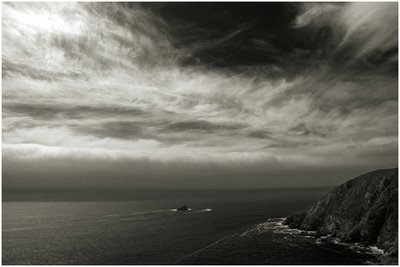
Uma das mais belas quimeras medievais é Finisterra. A procura de Finisterra foi tão intensa quanto a procura do Sacrado Graal ou a procura da Pedra Filosofal ou da Fonte da Eterna Juventude. Ao contrário, porém, do Cálice Sagrado ou da Fonte da Juventude, Finisterra estava ao alcance dos corações doloridos, dos doentes sem remédio, dos pecadores angustiados e de toda sorte de mente ou alma conturbada disposta a trilhar as lonjuras da terra ao seu encontro e chegar ali - ali onde a Europa daquela época pensava estar o Fim do Mundo.
Finisterra era o ponto em que o homem da Idade Média defrontava-se com o mistério do seu destino. Aquele era o último limite que Deus havia dado ao homem, seu ponto central, de onde ele, ser antropocêntrico, constatava que seguir além era impossível. Aquele lugar era o apogeu e o final da sua presença na Terra. A prefiguração do destino de toda Humanidade. Já pensou uma coisa dessas? Aqueles eram os tempos em que o homem media o mundo pelo seu ínfimo tamanho.E naquele ponto da costa da Espanha, diante do Oceano Tenebroso, ele avistava - não temos mais este previlégio - o Ignoto! Dali em diante, se não houvesse um audaz navegante, o mundo do homem terminava. Este sentimento nos é hoje desconhecido. O sentimento da nossa finitude.
Chega-se a Finisterra um pouco além de Compostela, na rota do afamado Caminho de Santiago. Qualquer agência de viajens vai lhe mostrar como é. O Caminho hoje é coisa comum. Fazem-se escursões de bicicleta para percorrê-lo. Na Idade Média o Caminho levava a um local de trégua. Hospital ou Convento, Compostela abrigava o doente, o miserável, o angustiado, o amedrontado fugindo da guerra, da peste e da tristeza por haver pecado. O Caminho levava a um desses locais seguros na terrível e sangrenta Idade Média, de guerras longuíssimas, suplicios públicos, pestes devastadoras. Em Compostela chegava-se perto do Céu com cânticos e incenso. Maravilha. Um pouco além no Caminho encontrava-se o fim do mundo. Uma rocha pendendo no abismo.

Quanto à Juventude, dela sabemos hoje que pode ser eterna. O cinema, essa invenção maravilhosa, faz para nós o que todos os alquimistas da Idade Média não conseguiram. O cinema faz-nos olhar para nós mesmos da maneira que almejamos - e, por causa dele, foram inventadas as clinicas de rejuvenescimento, o peeling, as massagens, as raspagens, as mulheres extirpam a gordura e introduzem silicone. A mulher extremamente bela foi considerada naquela época como uma invenção do diabo. Já viram as imagens das mulheres medievais em quadros e ilustrações da época? Eram baixinhas, gordas, cobertas de panos dos pés aos cabelos, sizudas, histéricas, assustadas, quase consideradas como o puro pecado. A outra imagem era a da mãe. A mãe constante, a provedora, a guardadora, a protetora.
O fractal aqui mostrado não resume nada disso. Entretanto, produzi uma imagem elementar que, penso, pode representar o sentimento de finitude - a espiral encravada como uma unha, ou pedaço de rocha, um rabisco sustentado no próprio elemento que o rodeia - no Nada!

Comments